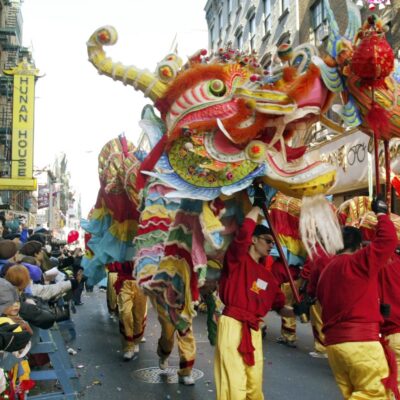In 1995, the Taiwan-born queer-identified author Ta-wei Chi 紀大偉’s first collection of literary works 感官世界 (Queer Senses: A Story-cycle of Sexualities) was published in traditional Chinese in Taiwan by Ping’s Publishing (平氏出版), followed by 膜 (The Membranes) published in 1996 by Linking Publishing (聯經出版) and 戀物癖 (Fetish Stories) published in 1998 by China Times (時報出版). This was the period when queer literature ‘blossomed in Taiwan’, and authors including Ta-wei Chi and his counterparts Chen Xue and Lucifer Hung (also known as Hong Ling), made early and significant contributions with literary works that deconstructed ‘the anticipated categories of gendered and sexual identity rather than the promulgation of the positive image of tongzhi’.
Ta-wei Chi and his generation of queer authors produced a new movement in what Ta-wei Chi himself later defined as tongzhi literature of Taiwan, a genre ‘consisting of literary works featuring homosexuality’, which has been ‘frequently celebrated as examples of resistance against non-Western and hence supposedly more oppressive contexts [in English-speaking societies]’. This movement has gained prominence largely due to English translations published since the 1990s in the US and Australia, as well as the pioneering English-language scholarly works such as those of Fran Martin and Petrus Liu on Taiwanese queer literature which have focussed on the sociocultural context of 1990s Taiwan.
Despite Ta-wei Chi’s undeniable impact on the history of tongzhi literature of Taiwan, and although tongzhi literature published in Taiwan and mainland China has been at the core of Chinese-language queer literature, the place of queer literature from Taiwan in mainland China—its publication, circulation, and reception—has received little attention. It was only in early 2003 that the collection膜 The Membranes (which includes the short novel ‘The Membranes’ of the same title and nine short stories including ‘嚎叫’ (Howl) and ‘早餐’(Breakfast)) was published in mainland China by Huayi Publishing House (华艺出版社), the first of Ta-wei Chi’s books to be made available in simplified Chinese. In 2012, mainland China’s People’s Education Press (人民教育出版社) and Chongqing Publishing House (重慶出版社) published an ‘expurgated simplified character edition of Membranes’, as described by Chris Schifani.
As a reader of Ta-wei Chi’s work since the early 2000s and as a queer scholar and translator from mainland China but now living in Australia and with a deep interest in tongzhi/queer literature in Chinese, I propose in this article that it is still important today to re-read Ta-wei Chi’s early fiction from the 1990s; and I will consider in particular Ta-wei Chi’s short stories ‘Breakfast’ and ‘Howl’, in the context of my own lived experience. In translating ‘Howl’ from Chinese into English in 2020, I connected my interest in queer literature with my interest in translation studies, enabling me to explore the connections between tongzhi literature of Taiwan and that of mainland China while acknowledging the differences in linguistic and cultural contexts in a way that does not entirely reduce the one to the other.
A short history of Ta-wei Chi in Taiwan and in mainland China
The 1990s in Taiwan were a phase in which ‘globalisation and localisation are inextricably bound together, especially in the terrain of gender and sexuality’, witnessing the greatest changes in notions of gender and sexuality in Taiwan’s history in the face of the rise of queer movements. It is in this context that Ta-wei Chi, an active participant of the 1990s queer movements, first used seductive, provocative, and carnivalesque language and narrative to challenge traditional gender roles, heteronormative sexuality, and the stigma of HIV/AIDS. During the 1990s, three literary anthologies of Ta-wei Chi’s work came out in Taiwan, including Queer Senses: A Story-cycle of Sexualities (1995 感官世界), The Membranes (1996 膜), and Fetish Stories (1998 戀物癖). Many of Ta-wei Chi’s fiction from these collections, in the form of short stories, use fetishism to ‘subvert, trouble, and resist traditional gender roles and heteronormative sexuality’ while at the same time highlighting ‘the difficulty of making intimacies that are so thoroughly imbricated in local histories and cultures legible in another language’, as seen for example in his short stories, ‘嚎叫’ (1998, trans. by Yahia Ma as ‘Howl’, 2021) and 香皂 (1995, trans. by Fran Martin as ‘The Scent of HIV’, 1998).
In this same period, new terms, phrases, and knowledge in relation to the queer merged, such as tongzhi 同志and kuer 酷兒which have since become the most acceptable terms in Taiwan, Hong Kong, and mainland China, and in translation from and into the Chinese language. Ta-wei Chi made an early significant contribution in 1994, when the English term ‘queer’ was translated as 酷兒 ku’er in Taiwan in the Queer issue of the journal 島嶼邊緣 (Isle Margin) co-edited by Ta-wei Chi, Lucifer Hung, and Dan Tang-mo. With a cover bearing the title 酷兒QUEER (in all caps) in both Chinese and English, this is perhaps the first appearance of ku’er as the translation of ‘queer’ in Taiwan. The timing of this pioneering issue coincided with the publication of the Chinese translations of Jean Genet’s A Thief ’s Journal (竊賊日記) by Lucifer Hung, and Manuel Puig’s Kiss of the Spiderwoman (蜘蛛女之吻) by Ta-wei Chi. The special feature, which ran to nearly 70 pages, included the translators’ prefaces to and excerpts from these two foreign novels, and an article entitled ‘Little Ku’er Encyclopaedia’ with 49 entries, interspersed with images seemingly taken from Western pornographic sources.
Ta-wei Chi also contributed to the increasing visibility and knowledge production of queer, HIV/AIDS, and queer literature in mainland China, with the publication of his short stories in simplified Chinese in literary magazines and as an anthology in the 2000s. Ta-wei Chi’s short stories such as ‘早餐’ (Breakfast) and ‘嚎叫’ (Howl) also appeared in literary magazines in mainland China, including The Selected Works of Taiwan-Hong Kong Literature (台港文學選刊), an official literary magazine published by the Federation of Literary and Arts Circles of Fujian Province (福建省文學藝術聯合會) which was established in 1984 with the prime aim of introducing Chinese-language literature from Taiwan, Hong Kong, Macau, and the Sinosphere at large to audiences in mainland China.
Reading ‘Breakfast’ in mainland China in the early 2000s
Ta-wei Chi’s seminal short story ‘早餐’ (Breakfast) has been repeatedly printed and anthologised in mainland China, making it a definitive and often talked-about item of tongzhi/queer literature from Taiwan in online discussions, such as on Dou Ban (豆瓣), an interest-based social networking platform. Written in 1999, ‘Breakfast’ won the Flash Story Award at the 21st United Daily News Literary Prize (第二十一屆聯合報文學獎極短篇小說獎首獎) in the same year. It was featured in the 2011 edition of Chi’s literary anthology 膜 (The Membranes) published by Linking Publishing in Taiwan. In 2018, a Cantonese nine-minute short film based on the story was produced by G Dot TV.
This ‘bite-sized’ short story features a relationship between a married man and his lover. Every morning, the husband makes breakfast for his wife and son; but he always spent the night elsewhere with his lover. The story is deeply queer in that it does not specify the husband’s lover’s name or gender but highlights, at the same time, the queer aspects of such encounters. ‘Breakfast’ rejects the binary use of named, gendered, sexed pronouns and expressions that might eradicate the queerness of desire and the body, gender fluidity, and the versatility of sexual identity.
Unlike much of Ta-wei Chi’s other works, ‘Breakfast’ was almost immediately made available in mainland China. As a reader in the early 2000s, I encountered ‘Breakfast’ in The Selected Works of Taiwan-Hong Kong Literature. It provided an escape from the (then) present by opening a door to discovering my own sexual identity and desires. ‘Breakfast’ encouraged me to understand how ambiguity and the fluidity of genders and desires may blur into one another, or become entangled, to produce powerful, non-normative narratives of the queer.
As I recall now, a variety of sexual subjects, identities, and knowledge that emerge from Ta-wei Chi’s texts readily come to mind, from contemporary China in the 21st century where ‘an increasing number of queer venues, organisations, sources of funding support and overt and covert forms of political and social activism have transformed urban China, as cultural and media studies scholar Hongwei Bao notes in Queer China: Lesbian and Gay Literature and Visual Culture under Postsocialism. At that time, living in a small town in China as a high school student struggling to confirm his sexual identity and sexuality, I was unaware of what was happening elsewhere. Neither did I understand what sex, sexuality, gender or romantic/sexual/other relationships were.
As a reader, by reading Ta-wei Chi’s short stories in a major literary magazine in mainland China (I asked my father for a subscription through our local China Office [中國郵政]), I was unconsciously committing a small act of resistance. While classic Western literature in Chinese translation—such as Leo Tolstoy’s А́нна Каре́нина (Anna Karenina), Alexandre Dumas’s Le Comte de Monte-Cristo (The Count of Monte Cristo), and Guy de Maupassant’s Bel-Ami—was strongly recommended, I was reading Ta-wei Chi’s ‘Breakfast’.
Here and now, researching queer literature from Taiwan, what I learn from ‘Breakfast’ is, as cultural studies scholar Fran Martin notes (in the afterword of the 2011 edition of 膜 (The Membranes) published by Linking Publishing) that Ta-wei Chi’s sexual subjects ‘inhabit the spaces of the military, educational, medical and familial systems’, and also urban sociocultural spheres in contemporary Taiwan as evidenced in the recurring convenience stores, coffee shops, and the like. Martin also points out that Ta-wei Chi’s stories ‘demonstrate ways of “queering” these everyday moments, suggesting ways in which unforeseen desires invest the mundane with surprising new intensity’.
Translating ‘Howl’ into English in China during COVID-19
‘Howl’ was first published in the 1998 collection Fetish Stories in Taiwan in traditional Chinese. In 2003 it was published in mainland China, in simplified Chinese, in The Selected Works of Taiwan-Hong Kong Literature, and was also included in the 2003 Huayi edition of The Membranes. The story is a first-person narrative, in which the narrator, who resides in ‘a tiny apartment with a single small window’, has a brief, ‘non-sexual’ encounter with a man nicknamed Amoeba (his full name is styled as □ □ □) who has already come out as living with HIV. The two men first meet in an enclosed space, a café called San Francisco, enter an enclosed tunnel ‘lit by a river of halogen lamps’, and visit an enclosed back-alley convenience store before they finally go home, where Amoeba enters and exits from the bathroom within the tiny apartment.
A crucial element in ‘Howl’, as in many of Ta-wei Chi’s other short stories, is its elaboration of the language of love in the age of HIV/AIDS, which indexes a fetishised form of confrontation with an atmosphere of homophobia and HIV/AIDS stigma and thus destabilises gender, sex, and sexuality norms. As I understand it now, ‘Howl’ represents the multi-dimensional queerness of the male body, such as the body affected by HIV/AIDS or the smell of the body, in a fetishistic, perverse manner. Back in the early 2000s, reading the story for the first time in The Selected Works of Taiwan-Hong Kong Literature, it offered me a nuanced picture of alternative knowledges of desire, sexuality, and HIV, which my high school biology teacher did not teach in the sex education sessions where we learned by ourselves from textbooks with faces blushing and hearts pounding. In early 2020, before the announcement of COVID-19 as a worldwide pandemic, I was commissioned to translate ‘Howl’ from traditional Chinese into English.
In pandemic lockdown in China, I floated with no foreseeable possibility of returning to Australia on a student visa (I had already commenced tertiary studies there) because of the closure of Australia’s borders to all non-citizens and non-residents effective 20 March 2020. In the context of my translating work, I alternated between the two editions of ‘Howl’ in Chinese: one was the mainland China edition in simplified Chinese published in 2003, the other was a digitised document in traditional Chinese sent from my commissioning editor. At the same time, metaphorically swinging between Taipei and San Francisco, the story itself is harnessed by a multitude of signs throughout the text: the peace sign spray-painted on the wall, the ‘O’ in the black-and-white cover of Allen Ginsberg’s Howl and Other Poems that has changed into a ☮, the wrappers of the milk candy printed all over with roses, the memos on the corkboard (post-it notes, pizza coupons, etc.), a tie-dye rainbow t-shirt, the neon sign flashing ‘San Francisco’, and the quotes of Ginsberg’s ‘Howl’ in English.
As the title suggests, Ta-wei Chi evokes Ginsberg repeatedly; and although at the outset the portrayal of Ginsberg may seem incidental, a more careful reading reveals what queer studies scholar Lee Edelman would call a ‘consequential erasure of a name’, an erasure that ‘never… escapes determination by the interdependence of epistemology and the closet.’ However, the erasure of the name that shields Amoeba’s sexual identity and his HIV-positive status also discloses the paradox of the closet: it inspires a fear of coming out (‘who’d wanna fuck around with Amoeba?’ even though ‘there was little risk of his transmitting the virus’); it enables the unnamed man living with HIV to enter the text as a vulnerable figure (‘Too much pressure and his slim body might shatter to pieces’); and it stands in a complicated relationship with the first-person narrator (who, like Ta-wei Chi himself, is an author and takes pleasure in cruising the café San Francisco while writing there). The anonymous ‘Amoeba’ is a painter, a Ginsberg reader, a graffiti artist who also cruises at San Francisco in Taipei, and a dreamer; he desires to ‘paint a San Francisco Bay full of roses’, wants to ‘strip naked and sunbathe’ in San Francisco.
In the climax of the story, the first-person narrator takes home the unnamed man, □ □ □, seeing his body. I, the queer translator, also entered the text, taking the pleasure of translating the non-normative body, its condition as vulnerable, skinny, and infected by HIV. I, as the translator, (and ‘I’, the first-person narrator) pinched and prodded ‘the various parts of his body with my thumbs and fists’, which made him ‘moan with pleasure’. I (and ‘I’) saw ‘a regular penis, unremarkable in its colour, shape, or size’, touching the body made ‘me’ wonder, ‘maybe it was a bridge, between heavenly pleasure and hellish pain?’ Ginsberg might have called the encounter ‘carezza’, which in Ginsberg’s own words, is ‘a platonic friendship in which people sleep together naked, caressing each other, but don’t come, saving their seed for yogic or other reasons’.
In mid-2021, my translation of ‘Howl’ in English was published. I received my physical copy, that had travelled across continents, borders, and checkpoints to mainland China via China Post. When I was remotely participating in the Literature from Taiwan workshop with emerging translators from the US, mainland China, Taiwan, and Hong Kong in The University of East Anglia’s summer school for translation, I was translating ‘Breakfast’ with the renowned queer translator Jeremy Tiang as the mentor calling in from the US and Ta-wei Chi calling in from Taipei.
The continuing importance of Ta-wei Chi’s work
In mid-December of 2021, I returned to Australia. Ta-wei Chi’s 1995 short novel The Membranes had been translated into English by Ari Heinrich, as a text which, in the translator’s words, ‘predicts contemporary concerns with painful accuracy’ even though it was first published in 1995. To celebrate the publication of this book, Ta-wei Chi joined The Bookshop Darlinghurst on the 10th of December 2023 where people from Australia, mainland China, Taiwan, and elsewhere were brought together. Through lively discussion, we explored diverse perspectives based on our shared experiences of reading Ta-wei Chi’s 1990s, which lead to greater understanding and connection among his readers as individuals and communities.
Re-reading Ta-wei Chi’s queer stories from the 1990s, then, allows us to see, feel, and revisit how queer literature is capable of connecting linguistic, cultural and historical contexts that have shaped our understanding of the queer and queerness in Chinese. How queer it is then to reflect on the moments that led us here, to this moment of union, of (queer) translators, scholars, readers from mainland China, Taiwan, Australia and beyond; and on my own personal journey from two decades previously, studiously devouring ‘Breakfast’ and later ‘Howl’ without knowing what the future could hold!
Further reading: Why queer translation needs Asian languages and contexts.
Want more on Taiwan? Click here!
Image: Reading (in) the queer 1990s. Credit: Author.




